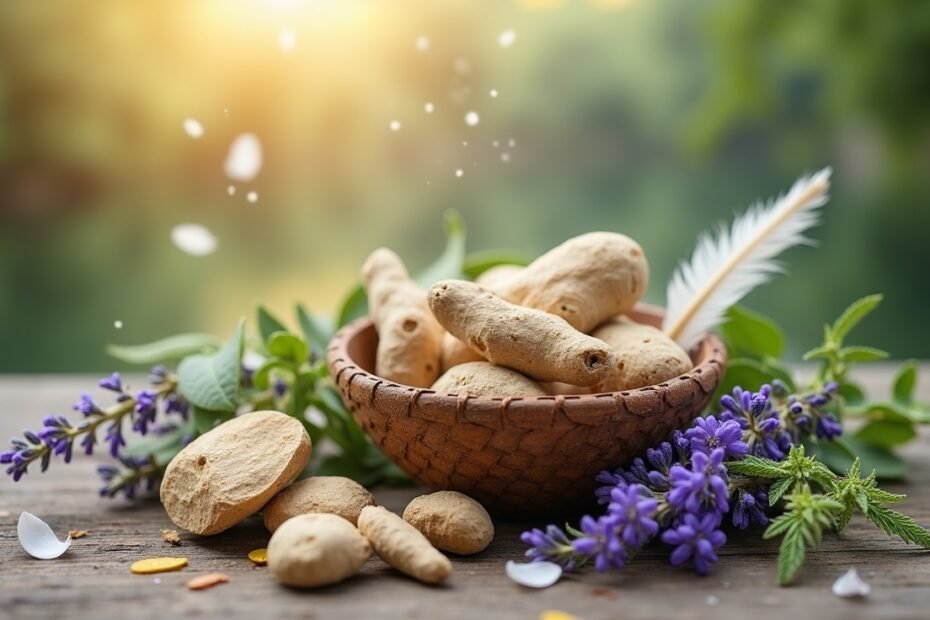In a world where 35% of adults struggle with insomnia, the quest for restful sleep has turned many toward natural remedies. Valerian root, passionflower, and other herbs aren’t just folklore—they’re scientifically supported tools to calm the mind, ease anxiety, and promote deeper sleep. Let’s explore how these plants work, their benefits, and how to use them safely for a night of true rejuvenation.
Why Herbal Sleep Aids? The Science of Relaxation
Herbs like valerian root interact with neurotransmitters such as GABA (gamma-aminobutyric acid), which slows brain activity and induces calm. A NIH study found that herbal remedies can improve sleep latency (time to fall asleep) by 30% without the grogginess linked to pharmaceuticals.
Key benefits of herbal sleep aids:
- Non-habit forming.
- Address both sleep and anxiety.
- Minimal side effects compared to prescription drugs.
Valerian Root: Nature’s Valium
Valerian root (Valeriana officinalis) has been used since ancient Greece to treat restlessness. Modern research reveals its compounds (valerenic acid and isovaleric acid) enhance GABA production.
What the Research Says:
- A Journal of Sleep Research study showed 450mg of valerian extract reduced sleep latency by 15 minutes in 89% of participants.
- Best for: Chronic insomnia, restless leg syndrome.
- How to use:
- Tea: Steep 1 tsp dried root in hot water for 10 minutes.
- Capsules: 300–600mg 30 minutes before bed.
Caution: Avoid combining with alcohol or sedatives.
Passionflower: Calming the Overactive Mind
Passionflower (Passiflora incarnata) contains apigenin, a flavonoid that binds to benzodiazepine receptors, easing anxiety-induced insomnia.
Evidence-Based Benefits:
- A Phytotherapy Research trial found passionflower tea improved sleep quality in 41% of participants with anxiety disorders.
- Best for: Racing thoughts, stress-related insomnia.
- How to use:
- Tea: Brew 1–2g dried leaves in 8oz water.
- Tincture: 10–30 drops in water before bed.
Chamomile: The Gentle Sleep Enhancer
Chamomile (Matricaria chamomilla) is rich in apigenin, which binds to GABA receptors similarly to passionflower but with milder effects.
Key Findings:
- A University of Pennsylvania study linked daily chamomile tea to a 40% reduction in middle-of-the-night awakenings.
- Best for: Mild insomnia, children, or sensitive individuals.
- How to use:
- Tea: 1–2 bags steeped for 5 minutes.
- Essential oil: Diffuse 5 drops in the bedroom.
Lavender: Aromatherapy for Deep Sleep
Lavender’s linalool compound reduces cortisol (stress hormone) levels. A Frontiers in Neurology review found inhaling lavender oil increased deep sleep by 20%.
Practical Uses:
- Pillow spray: Mix 10 drops lavender oil with water in a spray bottle.
- Bath soak: Add 5 drops oil + Epsom salts to warm water before bed.
Herbal Sleep Aids Comparison Table
| Herb | Active Compound | Benefits | Onset Time | Best Form |
|---|---|---|---|---|
| Valerian Root | Valerenic acid | Reduces sleep latency | 30–60 minutes | Capsules, tea |
| Passionflower | Apigenin | Eases anxiety-linked insomnia | 20–40 minutes | Tea, tincture |
| Chamomile | Apigenin | Mild sedation, safe for kids | 15–30 minutes | Tea, essential oil |
| Lavender | Linalool | Lowers cortisol, deepens sleep | 10–20 minutes | Oil, pillow spray |
Combining Herbs for Synergistic Effects
Relaxation Blend Tea Recipe:
- 1 tsp chamomile
- 1 tsp passionflower
- ½ tsp valerian root
- ½ tsp lemon balm
Steep in 12oz hot water for 10 minutes. Add honey to taste.
Safety note: Start with one herb to gauge tolerance before combining.
FAQ: Herbal Sleep Solutions Demystified
- Can I take these herbs daily?
Yes, but cycle usage (e.g., 5 days on, 2 days off) to prevent tolerance. - Are they safe during pregnancy?
Chamomile and lavender are generally safe; avoid valerian and passionflower without medical advice. - Do they interact with medications?
Valerian may amplify sedatives; consult a doctor if on antidepressants or anti-anxiety drugs. - How long until I see results?
Some feel effects immediately (lavender), while valerian may take 2–3 weeks for chronic issues. - Can children use herbal sleep aids?
Chamomile tea is safe for kids over 1; others require pediatrician approval.
Conclusion
Valerian root, passionflower, and their herbal allies offer a gentler path to restorative sleep—no prescription needed. Whether sipped as tea or inhaled as essential oil, these remedies address the root causes of sleeplessness: stress, anxiety, and an overactive mind. Tonight, swap sleeping pills for a cup of chamomile and let nature guide you to deeper rest.
Read also: Adaptogens: The Science-Backed Secret to Thriving in a Stressful World
